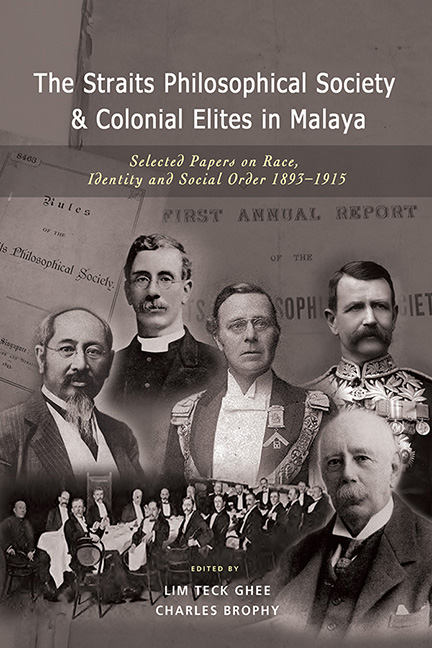 The Straits Philosophical Society and Colonial Elites in Malaya
The Straits Philosophical Society and Colonial Elites in Malaya 25 - The Future of the Malay Race
Published online by Cambridge University Press: 09 January 2024
Summary
Editors’ Note
Unlike Kynnersley’s 1901 essay, Ridley’s essay on the future of the Malay race offered a more pessimistic outlook for the Malays. Ridley, informed by his social Darwinism, argued that the Malays lacked the racial character to prevent subsumption by immigrant races, in particular the Chinese. He foresaw the Malay race intermixing with the Chinese and disappearing as they were integrated within a more dominant Chinese race. At the same time, he argued that two trends may delay this subsumption. The first was the presence of Islam as a differentiating factor between the Malays and Chinese, and the other was the presence of the British who may for some time artificially protect the Malays from external competition. In response Hanitsch, a botanist, Curator of the Raffles Library and Museum, and a colleague of Ridley, argued, against Ridley, that the long-term protection of the Malay race might be possible, but only on the basis of the restriction of immigration and through a system of education which would build upon existing trades and protect the current state of Malay society. To justify ongoing British protection of the Malays, Hanitsch noted:
The Malay is in many ways so childlike that for a long time he will require careful training and nurturing. If we left him alone, and all Europeans took passage for home today, I really believe he would turn tomorrow again into the bloodthirsty pirate he was before. But duly taken care of for some generations to come—and I don’t think ever any native race required more careful handling—I believe that the Malays would have a bright and prosperous future before them.
I take the title, the Future of the Malay Race, to refer to the distant future of the race—its final end, if ended it should be before the great globe and all that it inherits shall dissolve—and therefore I will attempt to study the probable end of the race. At the present time I think it is clear that the Malays are increasing in number, at least in the Peninsula, although successful reproduction of the race is not large, Malays have comparatively small families, and are losing a considerable number of children very young.
- Type
- Chapter
- Information
- The Straits Philosophical Society and Colonial Elites in MalayaSelected Papers on Race, Identity and Social Order 1893-1915, pp. 363 - 374Publisher: ISEAS–Yusof Ishak InstitutePrint publication year: 2023
